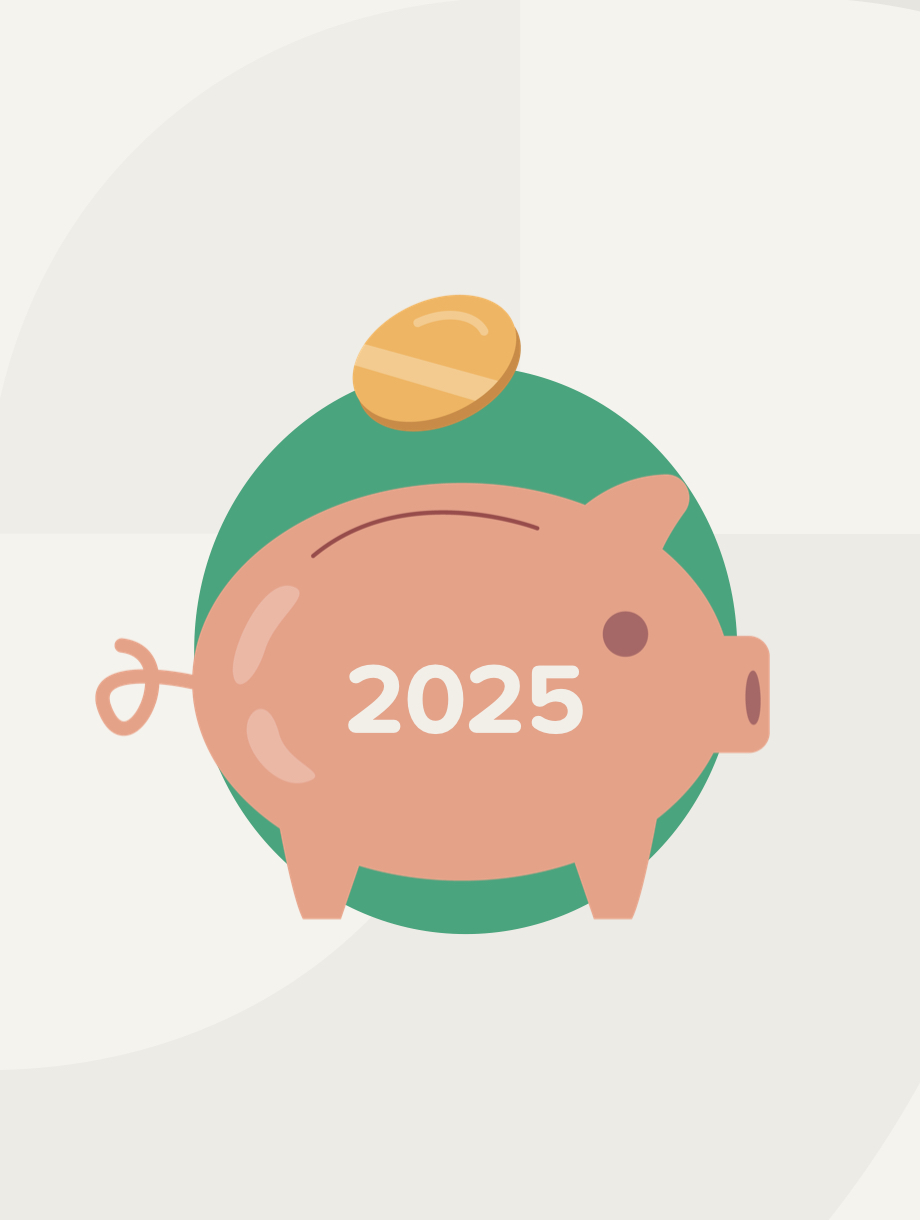.png)



The dawn of a new year brings with it a sense of renewal—a chance to reflect on the past, reset your priorities, and set goals for the future. It’s the perfect time to take control of one of the most pivotal aspects of your life: your finances. This year, why not make a resolution that has the power to transform your life? By mastering essential money principles and putting them into action, you can build a brighter, more secure financial future for yourself and your family.
It doesn’t matter where you are on your financial journey; these are the essential money principles that every consumer should understand to make smarter financial decisions, avoid common pitfalls, and build a secure financial future. By applying these principles, you can Stop Being a Sucker® and improve your overall financial health, gain better control over your spending, save effectively, and work toward your long-term financial goals.
1. Start Early, Invest Consistently
"Compound interest is the eighth wonder of the world. He who understands it, earns it; he who doesn’t, pays it.”
– Albert Einstein
Explanation: The sooner you start saving and investing, the more time your money has to grow through the power of compounding. Compounding allows the earnings on your investments to generate even more earnings over time, creating a snowball effect that accelerates your wealth. Even small, consistent contributions can lead to significant results if given enough time. Starting early not only reduces the pressure to save large amounts later but also lets your investments work harder for you, turning short-term sacrifices into long-term prosperity.
2. Live Below Your Means
"Do not save what is left after spending, but spend what is left after saving.”
– Warren Buffett
Explanation: Prioritize saving and investing over spending. This approach encourages financial discipline and long-term planning, ensuring your future is secure. Living below your means doesn’t mean depriving yourself but rather making thoughtful choices about your expenses. By cutting back on unnecessary luxuries and focusing on what truly matters, you create room to grow your savings, invest wisely, and build a stable financial foundation that can support your goals.
3. Understand the Power of Budgeting
"A budget is telling your money where to go instead of wondering where it went.”
– Dave Ramsey
Explanation: A budget ensures you’re in control of your finances. It’s a roadmap that helps you allocate your money to essential needs, savings, and personal goals effectively. By creating and sticking to a budget, you gain a clear understanding of your spending habits and avoid overspending. This practice not only builds financial stability but also sets the foundation for achieving long-term financial success, whether it’s paying off debt, saving for a big purchase, or planning for retirement.
4. Eliminate High-Interest Debt Quickly
"Debt is like any other trap, easy enough to get into, but hard enough to get out of.”
– Josh Billings
Explanation: High-interest debt, such as credit card balances or payday loans, can severely impact your financial well-being by accumulating costs faster than you can keep up. The longer you carry these debts, the more you end up paying in interest, leaving less room to save or invest for your future. Focus on paying off high-interest debt as quickly as possible—whether by using the avalanche method (tackling the highest interest debt first) or the snowball approach (starting with the smallest balances for quick wins). Once you eliminate this burden, you’ll have more financial freedom to allocate resources toward building a more secure and prosperous future.
5. Diversify Your Investments
"Don’t put all your eggs in one basket.”
– Andrew Carnegie
Explanation: Diversification is a key principle of smart investing. By spreading your investments across different asset classes—such as stocks, bonds, real estate, and mutual funds—you reduce the risk of being overly reliant on a single area. For example, if one sector experiences a downturn, the impact on your overall portfolio is minimized because other investments may perform well. Diversification helps create a more stable and resilient financial plan, protecting you from market volatility and unexpected losses.
6. Build an Emergency Fund
"Prepare for the worst, hope for the best.”
– Bill Mitchell
Explanation: Building an emergency fund is one of the most important steps in achieving financial stability. Having 3-6 months of living expenses saved in an easily accessible account acts as a safety net, protecting you from unexpected financial shocks like job loss, medical emergencies, or unexpected home or car repairs. This cushion gives you peace of mind and prevents you from going into debt when life throws you a curveball. Start small and contribute regularly to grow your fund over time.
7. Learn the Basics of Taxes
"In this world nothing can be said to be certain, except death and taxes.”
– Benjamin Franklin
Explanation: Understanding how taxes work is an essential life skill that can save you money and reduce stress. Familiarize yourself with tax brackets to know how much of your income is taxed at different levels, and learn about deductions and credits to legally minimize your tax liability. Deductions lower your taxable income, while credits directly reduce the amount of tax you owe—both can make a significant difference in your finances. By grasping these basics, you can plan smarter and keep more of your hard-earned money.
8. Invest in Yourself
"The best investment you can make is in yourself.”
– Warren Buffett
Explanation: Expanding your skills, knowledge, and education pays the highest returns. Whether it’s through taking courses, reading books, attending workshops, or pursuing hobbies that challenge you, investing in yourself helps you grow both personally and professionally. The more you learn and develop, the more valuable you become, opening up greater opportunities and enabling you to achieve long-term success. Remember, self-growth is a lifelong journey that builds confidence and resilience.
9. Avoid Lifestyle Inflation
"Too many people spend money they earned to buy things they don’t want, to impress people they don’t like.”
– Will Rogers
Explanation: Lifestyle inflation happens when your spending increases alongside your income, leaving you no better off financially despite earning more. It's tempting to upgrade your car, move to a bigger house, or splurge on luxuries as your salary grows, but doing so can delay your financial goals. Instead, focus on saving and investing the extra income to build wealth faster and create long-term financial security. By resisting lifestyle inflation, you can prioritize what truly matters and avoid unnecessary financial stress.
10. Know Your Financial Literacy Level
“An investment in knowledge pays the best interest.”
– Benjamin Franklin
Explanation: Understanding your financial literacy level is a crucial step toward building a stronger financial future. Tools like the Financial Literacy Quiz (TakeTheFLQ.com) can help you assess your knowledge of essential financial concepts like budgeting, saving, investing, and managing debt. By identifying areas where your knowledge may be lacking, you can take proactive steps to learn more, improve your skills, and make smarter, more informed financial decisions. Whether you're planning for retirement, paying off loans, or just trying to save more effectively, a solid grasp of financial literacy is key to achieving your goals.
11. Understand the Value of a Financial Education
"Financial fitness is not a pipe dream or a state of mind. It’s a reality if you are willing to pursue it and embrace it.”
– Will Robinson
Explanation: Most schools fail to teach practical money management skills like budgeting, investing, or understanding credit. This leaves many people unprepared to handle their personal finances effectively. By committing to self-education—through books, online courses, or financial advisors—you can gain the knowledge needed to make smart financial decisions. A strong financial education empowers you to take control of your money, avoid debt, and build a secure, prosperous future for yourself and your family. The more you learn, the more equipped you’ll be to achieve your goals.
12. Plan for Retirement Early
"The question isn’t at what age I want to retire, it’s at what income.”
– George Foreman
Explanation: Retirement planning isn’t just about deciding when to stop working; it’s about achieving financial independence and maintaining the lifestyle you want. Starting early is key, as it allows you to take full advantage of compound interest, turning small contributions into significant savings over time. Utilize employer-sponsored retirement plans, such as 401(k)s, and consider additional investment options like IRAs to maximize your savings. The earlier you begin, the more flexibility you’ll have in choosing when and how to retire comfortably without financial stress.
Now Is The Time
This year, Stop Being a Sucker® and commit to turning your financial dreams into achievable goals. Envision the life you want, and take proactive steps to make it a reality. With focus, discipline, and the actionable insights provided here, you can begin to shape a future filled with confidence, stability, and prosperity.
The time to act is now. The steps you take today can ripple through every aspect of your life, giving you the freedom to live on your terms. Welcome this New Year with a determined heart, an open mind, and a clear plan to unlock your financial potential. It’s not just a resolution—it’s the beginning of your financial transformation.

.png)
.png)




